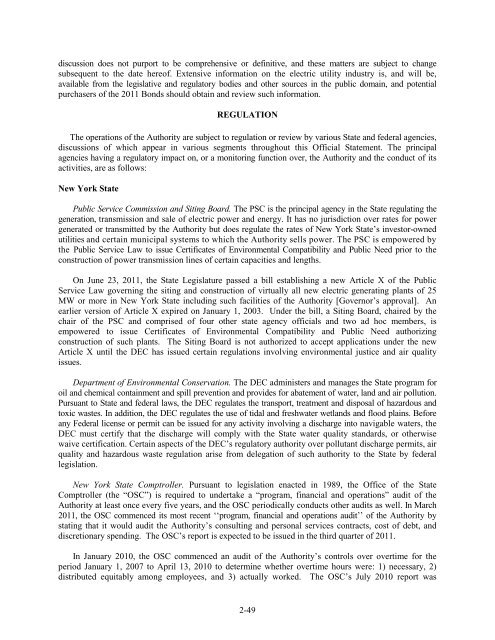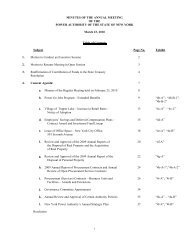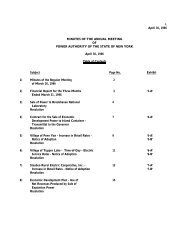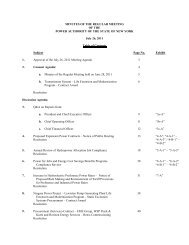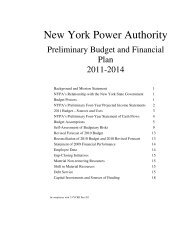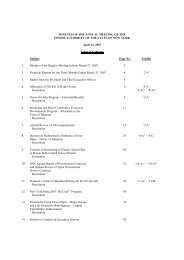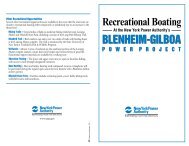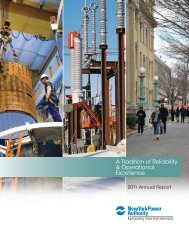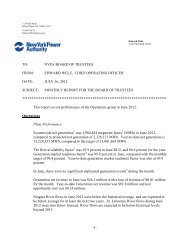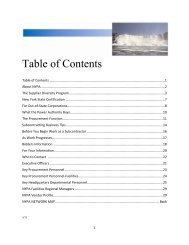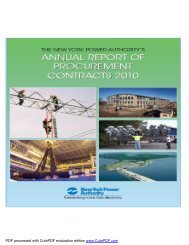July (pdf) - New York Power Authority
July (pdf) - New York Power Authority
July (pdf) - New York Power Authority
You also want an ePaper? Increase the reach of your titles
YUMPU automatically turns print PDFs into web optimized ePapers that Google loves.
discussion does not purport to be comprehensive or definitive, and these matters are subject to change<br />
subsequent to the date hereof. Extensive information on the electric utility industry is, and will be,<br />
available from the legislative and regulatory bodies and other sources in the public domain, and potential<br />
purchasers of the 2011 Bonds should obtain and review such information.<br />
REGULATION<br />
The operations of the <strong>Authority</strong> are subject to regulation or review by various State and federal agencies,<br />
discussions of which appear in various segments throughout this Official Statement. The principal<br />
agencies having a regulatory impact on, or a monitoring function over, the <strong>Authority</strong> and the conduct of its<br />
activities, are as follows:<br />
<strong>New</strong> <strong>York</strong> State<br />
Public Service Commission and Siting Board. The PSC is the principal agency in the State regulating the<br />
generation, transmission and sale of electric power and energy. It has no jurisdiction over rates for power<br />
generated or transmitted by the <strong>Authority</strong> but does regulate the rates of <strong>New</strong> <strong>York</strong> State’s investor-owned<br />
utilities and certain municipal systems to which the <strong>Authority</strong> sells power. The PSC is empowered by<br />
the Public Service Law to issue Certificates of Environmental Compatibility and Public Need prior to the<br />
construction of power transmission lines of certain capacities and lengths.<br />
On June 23, 2011, the State Legislature passed a bill establishing a new Article X of the Public<br />
Service Law governing the siting and construction of virtually all new electric generating plants of 25<br />
MW or more in <strong>New</strong> <strong>York</strong> State including such facilities of the <strong>Authority</strong> [Governor’s approval]. An<br />
earlier version of Article X expired on January 1, 2003. Under the bill, a Siting Board, chaired by the<br />
chair of the PSC and comprised of four other state agency officials and two ad hoc members, is<br />
empowered to issue Certificates of Environmental Compatibility and Public Need authorizing<br />
construction of such plants. The Siting Board is not authorized to accept applications under the new<br />
Article X until the DEC has issued certain regulations involving environmental justice and air quality<br />
issues.<br />
Department of Environmental Conservation. The DEC administers and manages the State program for<br />
oil and chemical containment and spill prevention and provides for abatement of water, land and air pollution.<br />
Pursuant to State and federal laws, the DEC regulates the transport, treatment and disposal of hazardous and<br />
toxic wastes. In addition, the DEC regulates the use of tidal and freshwater wetlands and flood plains. Before<br />
any Federal license or permit can be issued for any activity involving a discharge into navigable waters, the<br />
DEC must certify that the discharge will comply with the State water quality standards, or otherwise<br />
waive certification. Certain aspects of the DEC’s regulatory authority over pollutant discharge permits, air<br />
quality and hazardous waste regulation arise from delegation of such authority to the State by federal<br />
legislation.<br />
<strong>New</strong> <strong>York</strong> State Comptroller. Pursuant to legislation enacted in 1989, the Office of the State<br />
Comptroller (the “OSC”) is required to undertake a “program, financial and operations” audit of the<br />
<strong>Authority</strong> at least once every five years, and the OSC periodically conducts other audits as well. In March<br />
2011, the OSC commenced its most recent ‘‘program, financial and operations audit’’ of the <strong>Authority</strong> by<br />
stating that it would audit the <strong>Authority</strong>’s consulting and personal services contracts, cost of debt, and<br />
discretionary spending. The OSC’s report is expected to be issued in the third quarter of 2011.<br />
In January 2010, the OSC commenced an audit of the <strong>Authority</strong>’s controls over overtime for the<br />
period January 1, 2007 to April 13, 2010 to determine whether overtime hours were: 1) necessary, 2)<br />
distributed equitably among employees, and 3) actually worked. The OSC’s <strong>July</strong> 2010 report was<br />
2-49


